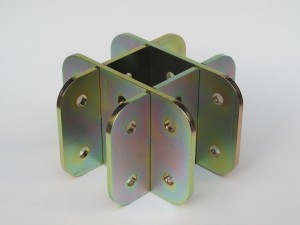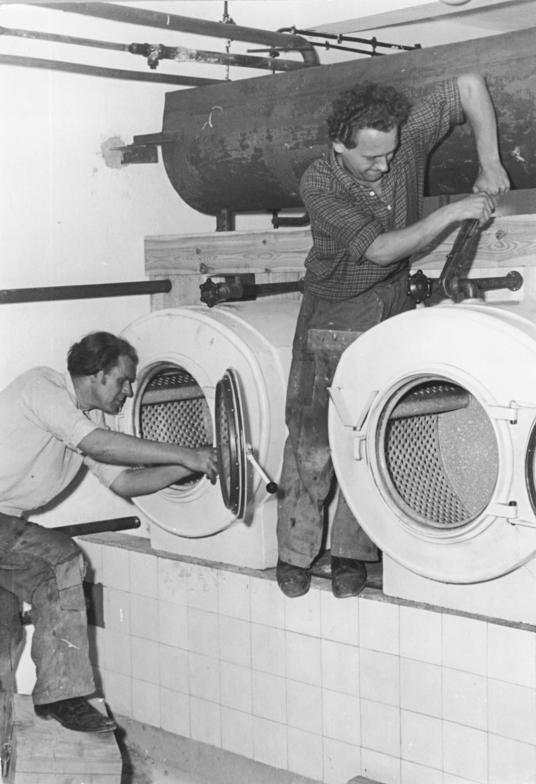I was at a conference in Salzburg about Circular Design. Conny Bakker who is doing great work in the field of circular economy and also sent a video message to the OSCEdays community gave a talk there via video-stream about 4 business models for circular washing machines. And I thought, there was missing one – the Open Source model. I wrote her an email with it – and I paste you the text below.
The business models she was mentioning were (if I remember correctly):
(1) Longevity: a longlasting product is the better one and will attract more customers.
(2) Leasing: You don’t buy but lease the machine from the manufacturer for some time. So he has an interest in building a high quality and longlasting product.
(3) Sell washes not the machine: A manufacturer places a machine in your house and you buy 10 000 washes from him for example. If the machine has a defect, he comes and repairs it. A longlasting machine is in his interest.
(4) Sell clean clothes not the machine: A company comes by and picks your dirty laundry and delivers clean ones. They have an interest in longlasting, repairable machines.
You may notice, that 3 of this business models have a problem with or change the concept of “ownership”.
Update: Here is a Video recording of her talk.
Here is my Email to Conny Bakker:
The 5th Circular Economy Business Model for A Washing Machine
"Hello Conny Bakker,
(. . .)
I was in Salzburg giving a lecture on Saturday right before yours was sent. I really enjoyed your video, especially the part about the 4 business models. But I found there is one missing. The one that excites me the most.
The Open Source Model
Of course it is in a more hypothetical stadium. But have a look. Do you know this project by a student: http://www.jamesdysonaward.org/en-GB/projects/lincrevable/
It does not particulary speak about open source. But the general idea here is to have a washing machine delivered to customers for self assembly – DIY – like IKEA delivers their products for self assembly. When the customers have assembled the washing machines themselves they will be able to repair it. And others too. This helps to prolong the life.
The Openess will allow the washing machine to become an open platform. Innovative minds and companies can contribute new ideas and features constantly. And can even come up with ideas, how to reuse or (re)manufacture the parts. It is not just done by one company. The circularity is decentralized.
That is the idea of many open source products – being platforms. Because they allow and facilitate ongoing open innovation through communication and delivery of parts, their products grow features and possibilities over time more creatively. The products grow in value. Think of an Arduino. Every week there are more projects you can do with it shared in the Arduino forums.
Or imagine you buy an open structures table http://openstructures.net . The things you can do with the parts will become more every year. It is not just one company spending time and brainpower to evolve the product. It is many. Including yourself as a customer, if you like.

For customers it is the better washing machine.
And it does not mean that they have to assemble the machine themselves. Third party companies can do it for them. As a service. As partners in the platform.
With a strong brand there is a strong business here for the company providing parts, communication and services around or – similar to one of your other examples – with the machine.
There are a lot of Arudino clones in the market. But Arduino is a stable and profitable company nowadays.
So in short: This business model is about being open and the circularity works decentralized.
And, this is also important I think, the washing machine will be owned by the customer! No new ownership model needed.
Thank you for your work and I hope this inspires you a bit.
Lars Zimmermann"
A Challenge?
How is this a challenge? The challenge is to make it happen now :-). And to challenge this challenge. What comes to your mind? Can this work? And if not, why?
Images:
1 - Bundesarchiv Bild 183-15161-0001, Berlin, Bau Karl-Marx-Allee, Block 15, Waschmaschinen (CC-BY-SA)
2 - IFA 2010 Internationale Funkausstellung Berlin 111.JPG (CC-BY-SA)
3 - original-2_1_7-300x225 – by Lukas Wegwerth – (CC-BY-SA)
